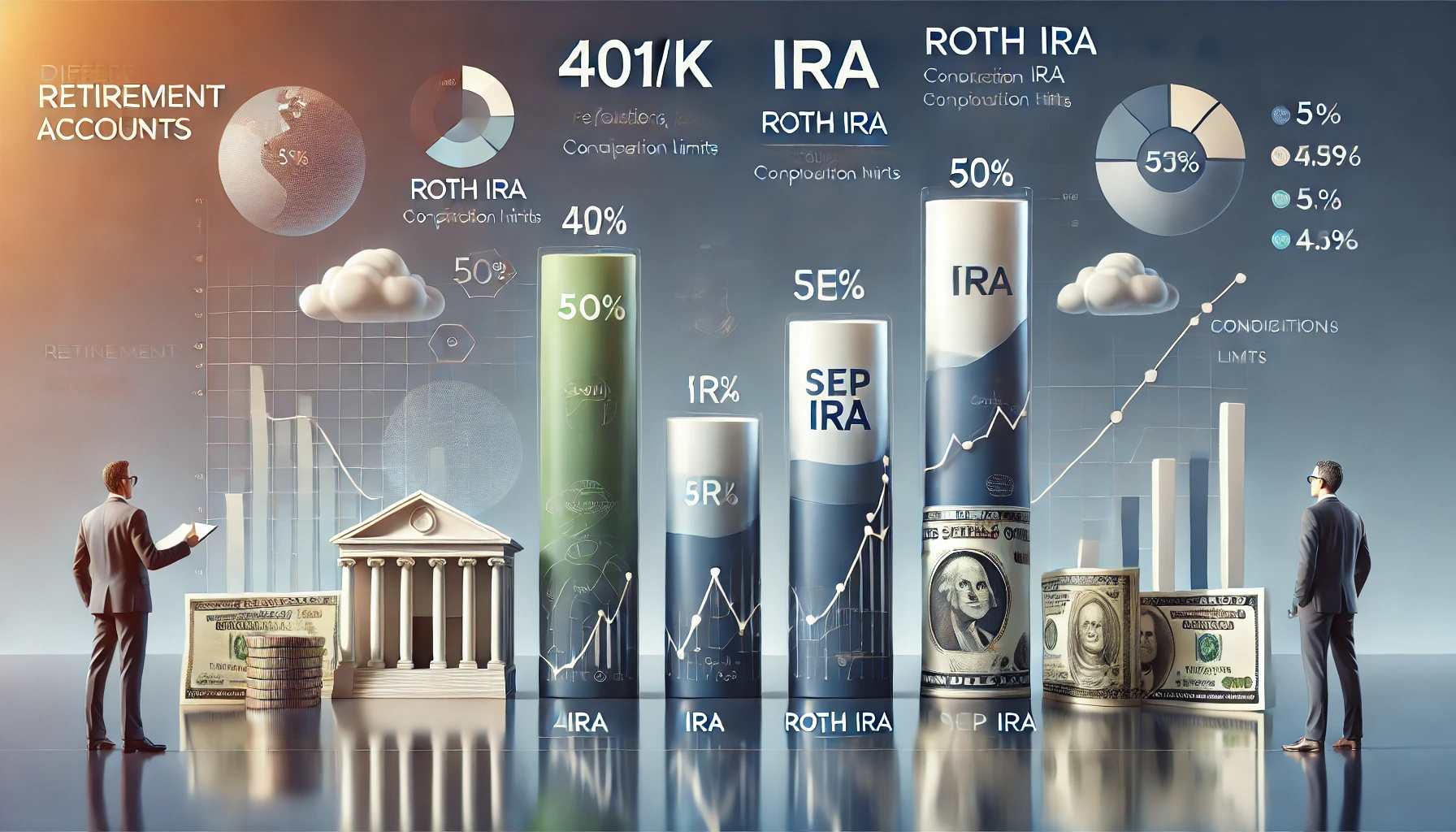Choosing the right retirement account is crucial for building a secure financial future. With over 20 years of experience in financial planning, I’ve helped many clients navigate their retirement savings options. This blog provides a comprehensive comparison of IRA, 401(k), and Roth IRA accounts to help you make informed decisions about your retirement savings strategy.

Traditional IRA
Overview
A Traditional IRA (Individual Retirement Account) allows you to contribute pre-tax income, which can reduce your taxable income for the year. Taxes are paid upon withdrawal during retirement.
Example: If you contribute $6,000 to a Traditional IRA and you’re in a 22% tax bracket, you could reduce your taxable income by $6,000, potentially saving $1,320 in taxes for that year.
Contribution Limits
For 2024, the contribution limit is $6,500, or $7,500 if you’re 50 or older (catch-up contribution).
Tax Benefits
- Tax-Deductible Contributions: Contributions may be tax-deductible depending on your income and other factors.
- Tax-Deferred Growth: Earnings grow tax-deferred until you withdraw funds.
401(k) Plan
Overview
A 401(k) is an employer-sponsored retirement plan that allows employees to contribute pre-tax income. Some employers also offer matching contributions.
Example: If your employer matches 50% of your contributions up to 6% of your salary and you earn $60,000, contributing 6% ($3,600) would result in an additional $1,800 from your employer.
Contribution Limits
For 2024, the contribution limit is $23,000, or $30,500 if you’re 50 or older (catch-up contribution).
Tax Benefits
- Tax-Deferred Growth: Similar to a Traditional IRA, earnings grow tax-deferred until withdrawal.
- Employer Matching: Free money contributed by your employer based on your contributions.
Roth IRA
Overview
A Roth IRA allows you to contribute after-tax income, meaning withdrawals during retirement are tax-free, provided certain conditions are met.
Example: If you contribute $6,000 to a Roth IRA and it grows to $10,000 by retirement, you can withdraw the entire $10,000 tax-free.
Contribution Limits
For 2024, the contribution limit is $6,500, or $7,500 if you’re 50 or older (catch-up contribution).
Tax Benefits
- Tax-Free Withdrawals: Withdrawals are tax-free in retirement if you meet the age and holding period requirements.
- No Required Minimum Distributions (RMDs): Unlike Traditional IRAs and 401(k)s, Roth IRAs do not have RMDs during the account holder’s lifetime.
Comparing the Accounts
Key Differences
- Tax Treatment: Traditional IRA and 401(k) contributions are tax-deductible, while Roth IRA contributions are made with after-tax dollars.
- Withdrawal Taxation: Withdrawals from Traditional IRA and 401(k) are taxed as ordinary income, while Roth IRA withdrawals are tax-free if conditions are met.
- Contribution Limits: 401(k) has higher contribution limits compared to IRA and Roth IRA.
Example: For someone in a high tax bracket, contributing to a Traditional IRA or 401(k) might be advantageous for the current tax year, while a Roth IRA might be preferable if you expect to be in a higher tax bracket in retirement.
Choosing the Right Account
Factors to Consider
- Current vs. Future Tax Bracket: Consider whether you expect your tax rate to be higher or lower in retirement.
- Employer Matching: Take advantage of 401(k) employer matches before contributing to an IRA.
- Investment Goals: Align your choice with your long-term retirement goals and savings strategy.
Professional Advice
Consult with a financial advisor to tailor your retirement savings strategy to your individual financial situation and retirement goals.
Conclusion
Understanding the differences between IRA, 401(k), and Roth IRA accounts is essential for effective retirement planning. By evaluating your tax situation, contribution limits, and retirement goals, you can choose the account that best fits your needs. Implementing a well-informed retirement savings strategy will help you build a secure financial future.
Resources for Further Information
Retirement Account Guides
- IRA Information: Learn more about Traditional and Roth IRAs at IRS IRA.
- 401(k) Plans: Find details on 401(k) plans at IRS 401(k).
Retirement Planning Tools